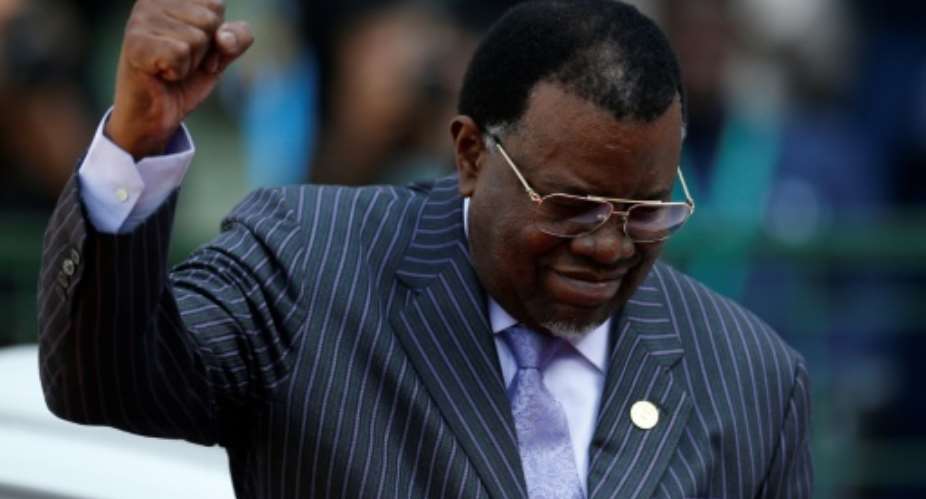Namibia's President Hage Geingob, who was re-elected on Saturday, is still riding on the legacy of his party's role in the liberation struggle almost three decades after the country's independence from South Africa.
Before a single vote was cast in Wednesday's general election, the 78-year-old could be almost certain of securing a second five-year term.
A member of the SWAPO party, which has governed Namibia since independence in 1990, Geingob's first term was overshadowed by a recession and graft allegations.
He won 87 percent of votes in Namibia's last elections in 2014, more than the 76 percent his predecessor Hifikepunye Pohamba garnered in 2009.
Geingob has had to strike a precarious balance between reminding the country of his party's heroics and appealing to Namibia's "born frees" -- which represent around a third of the voting population.
The man who once lived in exile as a SWAPO representative in Botswana and the United States during South African rule, pledged in his election campaign this time to eradicate poverty by 2022.
'Namibian House'
Born on August 3, 1941 in a village in northern Namibia, Geingob became the country's first president from outside the majority Ovambo ethnic group.
He is no stranger to power, having served as the country's first prime minister from 1990 to 2002.
After a spell in the political wilderness he returned to the prime minister's office in 2012.
Before politics, Geingob worked for the United Nations on governance issues. His doctoral thesis at the University of Leeds, in Britain, was titled "State Formation in Namibia: Promoting Democracy and Good Governance".
But Geingob's first term saw the southwest African country through a sustained recession and one of its worst droughts in history.
Inequality only grew wider under his rule, despite an ambitious "prosperity plan" and a pledge to build a "Namibian House" for all.
In 2014 he used his power to enlarge parliament and create an array of new cabinet positions deemed unnecessary by his opponents.
"You could say he didn't elaborate who is living in the nice rooms," said economic analyst Henning Melber.
"Who is living in the basement and who is doing the washing."





 Former Kotoko Player George Asare elected SRC President at PUG Law Faculty
Former Kotoko Player George Asare elected SRC President at PUG Law Faculty
 2024 elections: Consider ‘dumsor’ when casting your votes; NPP deserves less — P...
2024 elections: Consider ‘dumsor’ when casting your votes; NPP deserves less — P...
 You have no grounds to call Mahama incompetent; you’ve failed — Prof. Marfo blas...
You have no grounds to call Mahama incompetent; you’ve failed — Prof. Marfo blas...
 2024 elections: NPP creates better policies for people like us; we’ll vote for B...
2024 elections: NPP creates better policies for people like us; we’ll vote for B...
 Don’t exchange your life for wealth; a sparkle of fire can be your end — Gender ...
Don’t exchange your life for wealth; a sparkle of fire can be your end — Gender ...
 Ghana’s newly installed Poland train reportedly involved in accident while on a ...
Ghana’s newly installed Poland train reportedly involved in accident while on a ...
 Chieftaincy disputes: Government imposes 4pm to 7am curfew on Sampa township
Chieftaincy disputes: Government imposes 4pm to 7am curfew on Sampa township
 Franklin Cudjoe fumes at unaccountable wasteful executive living large at the ex...
Franklin Cudjoe fumes at unaccountable wasteful executive living large at the ex...
 I'll 'stoop too low' for votes; I'm never moved by your propaganda — Oquaye Jnr ...
I'll 'stoop too low' for votes; I'm never moved by your propaganda — Oquaye Jnr ...
 Kumasi Thermal Plant commissioning: I pray God opens the eyes of leaders who don...
Kumasi Thermal Plant commissioning: I pray God opens the eyes of leaders who don...
